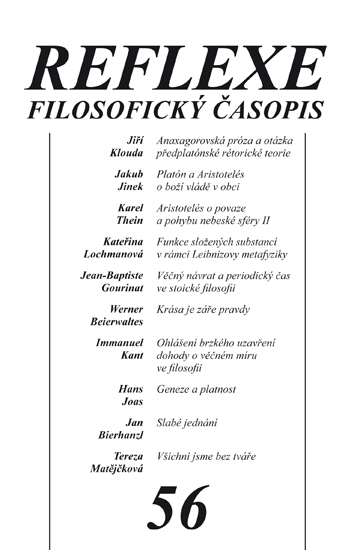Aristotelés o povaze a pohybu nebeské sféry II. O nebi a problém nehybného hybatele
Aristotle on the Nature and Motion of the Celestial Sphere II. De caelo and the Problem of the Unmoved Mover
Author(s): Karel TheinSubject(s): Ancient Philosphy
Published by: Univerzita Karlova v Praze, Nakladatelství Karolinum
Keywords: Aristotle; De caelo; celestial sphere; unmoved mover
Summary/Abstract: Aristotle’s De caelo I–II establishes the perfect circular motion as the kind of motion that necessarily belongs to the celestial sphere, which itself consists of a correlatively perfect and internally animate ‘first of bodily substances’. The latter, despite its entirely material nature, is repeatedly described as something divine and topically separate from the sublunary realm of generation and destruction, and it can be legitimately understood as the only body that moves itself in a full, non-qualified sense. The issue is therefore to find out how Aristotle reconciles (or fails to reconcile) this properly cosmological innovation with the passages where he introduces a non-physical agent or an unmoved mover that is apparently responsible for the same celestial motion or, at the very least, for some of its properties. Concerning the De caelo itself, commentators have focused on three passages which seem to imply the presence of such a mover in this treatise (I,9,279a11–b3; II,6,288a27–b7; II,12,292a14– b25). The first part of this article offers a close reexamination of these passages and concludes that none of them points unequivocally towards the unmoved mover as a source of celestial motion. This conclusion, however, makes it even more pressing to ask, as we do in the article’s second part, about the relation between the De caelo and, especially, Metaphysics XII, where such a mover plays an important role in explaining the arrangement of the universe including its celestial sphere. Instead of relying on the developmental explanation, the article concludes that Aristotle does not strive to elaborate an overarching scheme that would reconcile a self-moving principle of celestial motion (a principle argued for in Aristotle’s natural science) with an unmoved mover whose activity consists in thinking and whose nature is properly metaphysical.
Journal: Reflexe
- Issue Year: 2019
- Issue No: 56
- Page Range: 63-87
- Page Count: 25
- Language: Czech

